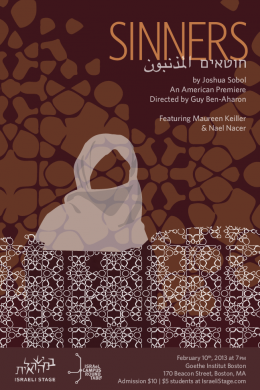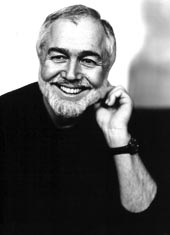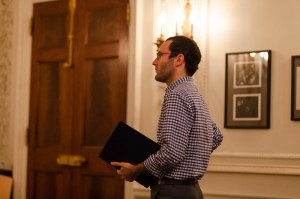Theater Interview: Israeli Dramatist Joshua Sobol on the Shock of “Sinners”
“As a white atheist male I am told it is none of my business to deal with what’s going on in the so-called de-colonized societies enforcing their religious laws on their citizens.” — Joshua Sobol
Sinners, or The English Teacher by Joshua Sobol. Directed by Guy Ben-Aharon. Presented by Israeli Stage. At the Goethe Institut, 170 Beacon Street, Boston, MA, February 10.
By Bill Marx
British dramatist David Edgar, in his 1988 book The Second Time as Farce, contrasts what he calls “the theater of fact” with the Brechtian tradition of political theater. The former focuses on the visceral reality of public injustice. “As in Brecht,” Edgar writes, “the aim is to force the audience to respond analytically; but instead of distancing the audience from the occurrences, these writers involve the audience, provoking them into thought by the very surprise and shock of the images.”
2008’s Sinners, by veteran, Israeli dramatist Joshua Sobol (receiving its American premiere via the Israeli Stage) is a theatrical protest against heinous fact: the stoning of women to death in Iran and other Middle Eastern countries. The play’s setting is stark and startling: Layla, a married professor of English, is buried over her waist in the desert sand. She is about to be stoned because of accusations she had an adulterous affair with one of her married students, who, out of guilt, talked about the tryst to the authorities.
The script has generated plenty of controversy in and out of Israel. Israeli Stage artistic director Guy Ben-Aharon is staging the script with a cast that includes Maureen Keiller and Nael Nacer. The Fuse‘s Ian Thal and I sent some questions via e-mail to Sobol about the political resonances of Sinners, as well as the challenges the script presents to performers and audiences.
Arts Fuse: What attracted you to this subject matter of violence against women in Islamic fundamentalist societies?
Joshua Sobol: I was shocked to read about the barbaric practice of stoning women to death. I was surprised by its widespread use and by the huge number of women who were stoned to death since the Islamist revolution in Iran and recently in some other countries. But what surprised and shocked me almost to the same extent was the indifference shown by civilized nations and by the liberal democratic western states to this crime against humanity. Regimes that practice this crime of utmost savagery as part of their judicial system should be treated as criminal regimes and should be excluded from the United Nations.
AF: What were the obstacles presented in dramatizing a story that had neither an Israeli nor Jewish theme or setting?
Sobol: The main obstacle to overcome was the so-called politically-correct, recently established taboos. As a white, atheist male, I am told it is none of my business to deal with what’s going on in the so-called de-colonized societies enforcing their religious laws on their citizens. But as a human being, I cannot and should not respect that dictum, and as a dramatist, it is exactly my affair and my responsibility to give a voice to the voiceless victims of inhuman savagery. A woman sentenced to death for having loved a man who is not her husband, and thus being buried alive up to her bosom and waiting for a crowd of wild males to stone her to death, is the epitome of the voiceless victim, whose voice should shatter the fundaments of our world. The duty to carry this stifled voice from one end of the world to the other has nothing to do with being Israeli, Jewish, or Christian. It has to do with being human or giving up one’s humanity.
AF: I believe you have directed Sinners—what challenges does the play pose for actors?
Sobol: The main challenge for the actress consists in transmitting all shades of tenderness, love, passion, fury, yearning, lust, repugnance, and forgiveness with nothing but her face, or rather with that part of her face that remains visible. When I directed the play in Tel Aviv, I confided the woman’s role to the actress Yiar Wolpe, who excels at commanding a very rich and exceptionally expressive body language, and I asked her to use her physical confinement of being buried up to her bosom as an urge to transport her body-language into her face. The challenge for the actor was to overcome the depravation of a collaborator with a criminal regime and to find the moment when he retrieves his full humanity.
AF: The setting’s allusion to Samuel Beckett’s Happy Days is obvious. Is this in some ways an absurdist comedy?
Sobol: Sinners is anything but an absurdist comedy. I don’t know what Beckett had in mind when he chose to bury Winnie in a mound up to above her waist. One thing I know for sure: the more than thousand women who have been buried alive in the last 30 years up to above their waist in the sands of the Middle East were not the victims of an absurdist comedy. They were the victims of a horrible tragedy that is far from having played its final act in the seismic convulsions that have been shaking the people living between the Mediterranean Sea and Indian Ocean. With Sinners I wanted to draw the attention to one aspect of this tragedy.
AF: The play has been translated into German, Hungarian, and English. There are upcoming performances scheduled in Bonn and Budapest, as well as a staged reading in Boston. What do you think is the relevance of your play to these different societies?
Sobol: If the world has become one global village, then the stoning of women in one corner of the village should concern all the members of the human community.
AF: One Israeli critic suggested that the real test of the so-called “Arab Spring” would be whether Sinners will ever be performed in an predominantly Arab or Muslim country. Meanwhile, some have objected that the trappings of Islam (the chador, the prayer rug, and the fact that the unnamed country has a coast with the Indian ocean) focuses the play’s attack on Islamic extremism, not on religious fundamentalism in general. Have you been surprised by these comments?
Sobol: In my play The Jerusalem Syndrome (1987), I dealt with the historical disasterous consequences of Jewish zealot fundamentalism and its contemporary partisans in the Israeli political arena. It had cost me my post as artistic director of the Haifa Municipal Theatre. Way back in 1973, I dealt with the Orthodox religion coercion in Israel in my play Status-Quo-Vadis? Religious extremism is always catastrophic, be it Christian, Jewish, or Islamist. Over the years, I have grown used to all kinds of comments about my plays. When a play is strong, some comments may have the quality of a hang-over, which is anything but surprising.
AF: Have the reactions of Israeli theatre-going audiences to Sinners broken down into their political perspectives?
Sobol: Theatre-going audiences in Israel as in Germany were strongly moved or even shocked by Sinners. The reaction I valued most came from a young woman, a very talented, Palestinian-Israeli film-maker. Having seen the show, she told me she appreciated it as a drama that paid homage to the great courage of Arab women who dare to stand up and fight for the liberation of women and for their human rights and full equality in Muslim countries. She said she considered Layla (the protagnist of Sinners) as a model of the few brave pioneers of the struggle for the liberation of women in the Muslim world, and she added that the time will come when the revolt of these women will spread like fire in the brush, and this will be the true Arab Spring.



